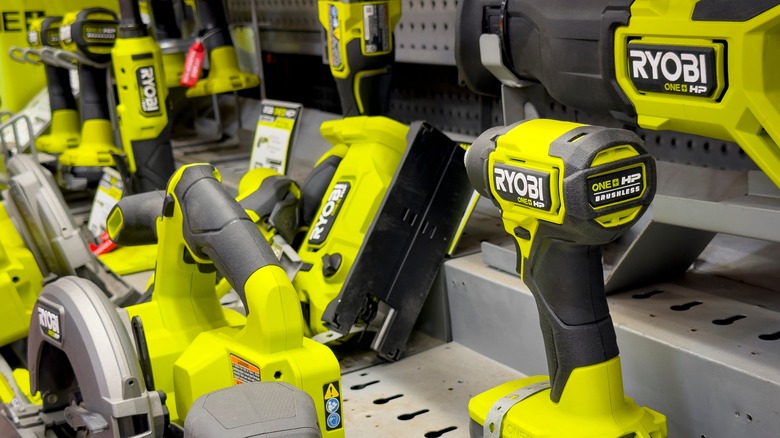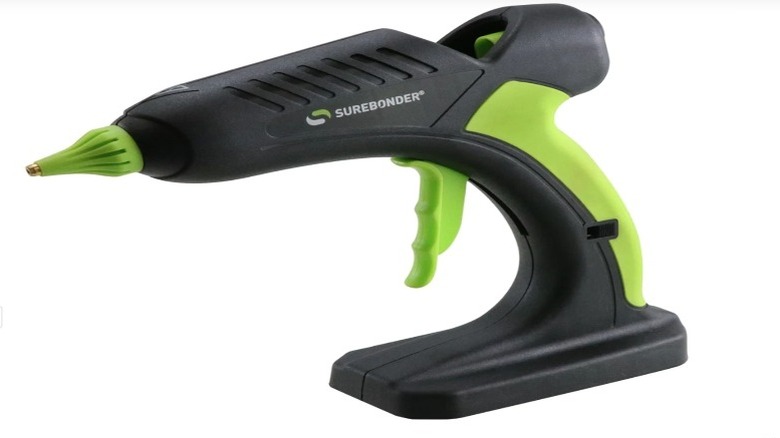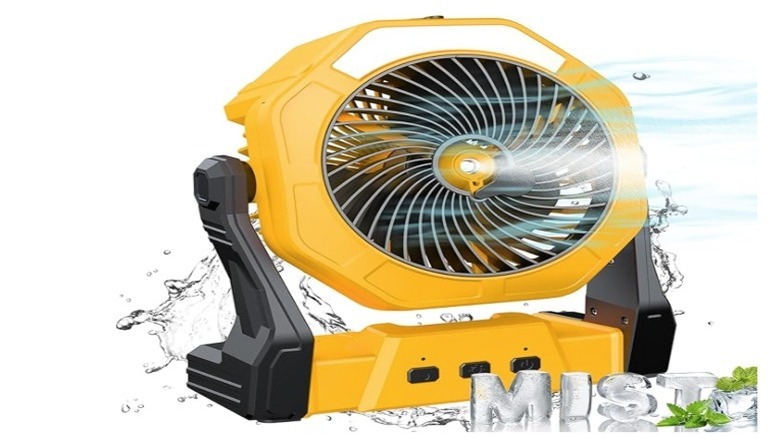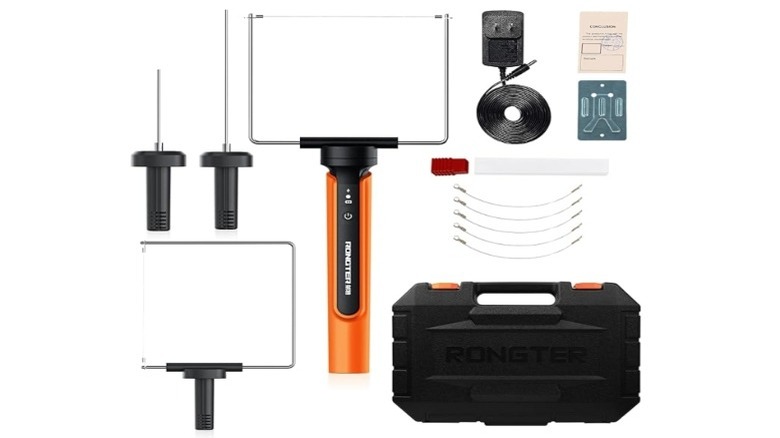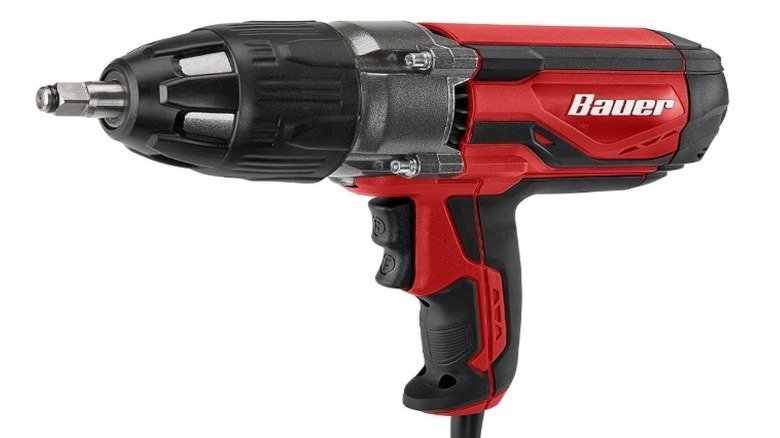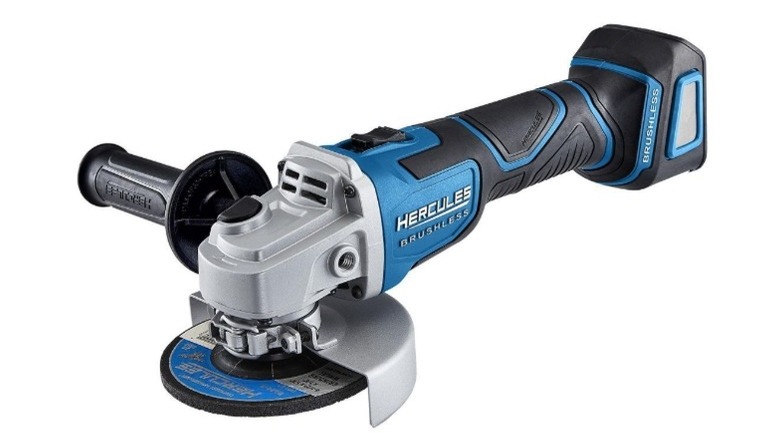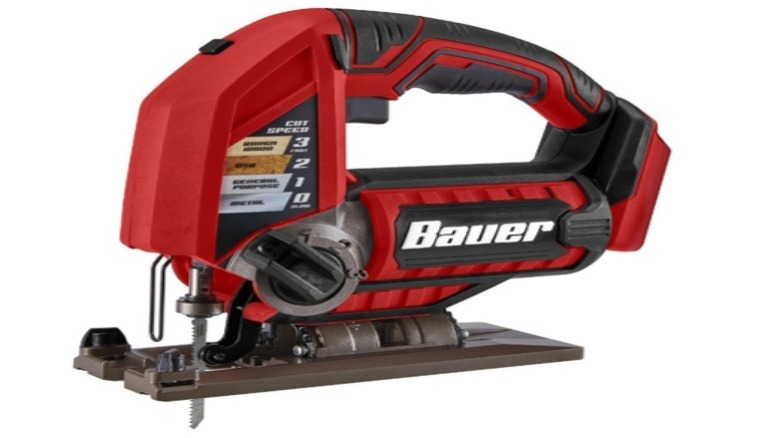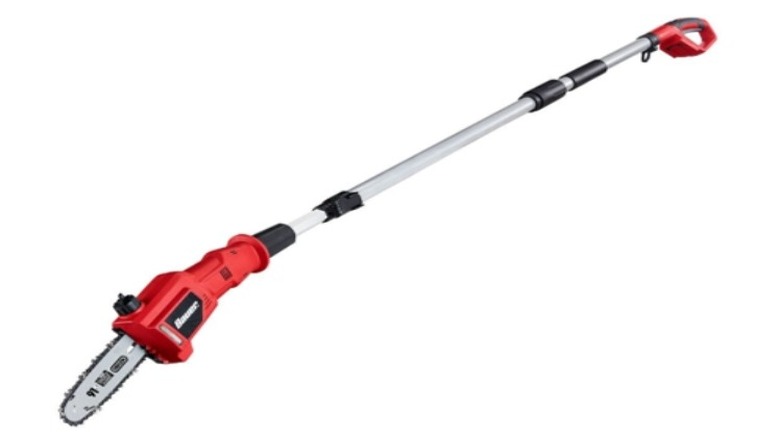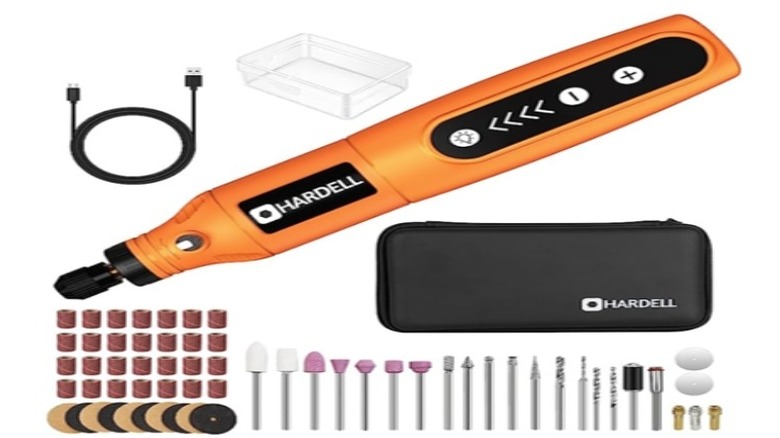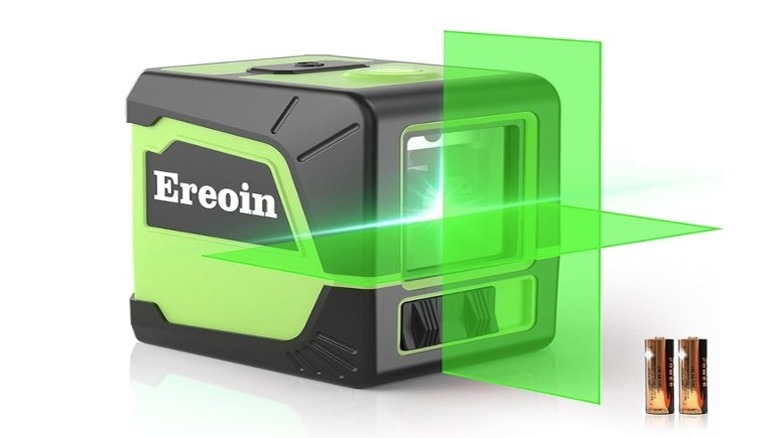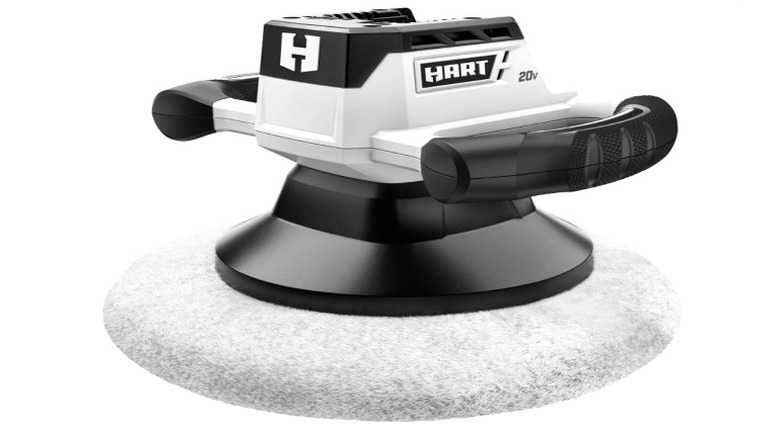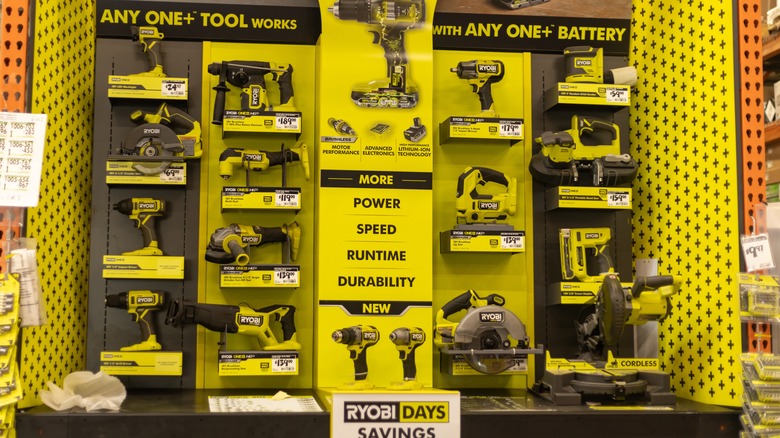The 10 Best Budget-Friendly Alternatives To Ryobi Tools
Ryobi is well-known for being a great budget-friendly line of power tools and equipment. The 80-year-old company has built its reputation on a balance of affordability, quality, and innovation. However, there are plenty of less expensive alternatives that can get the job done just as well.
These neon green tools have gained a cult following for their interchangeable rechargeable ONE+ batteries, variety of products and accessories, and wallet-friendly prices. They also don't compromise on durability, designed to withstand rigorous use for years. Their collection ranges from basics like power drills and saws to strange products like bug zappers and patio cleaners.
While Ryobi tends to be affordable compared to big names like Milwaukee and Makita, some Ryobi products clock in at higher prices than other budget brands. You don't necessarily have to buy the best of the best to get the job done right. If saving money is a top priority, you'll appreciate these 10 budget-friendly alternatives to Ryobi tools.
1. Surebonder Pro Hot Melt Gun
A must-have in every toolbox, a great hot melt gun should heat up quickly and stay hot for as long as your project lasts. Surebonder's Pro Hot Melt Gun gives Ryobi's comparable version a run for its money while saving you a few bucks.
The PRO2-60 60 Watt 18 Volt Cordless Professional Heavy Duty Full Size Hot Melt Glue Gun offers a similar look, feel, and size as the Ryobi 18-Volt ONE+ Cordless Hot Glue Gun. Both are battery-powered to keep pesky cords out of the way. Both offer interchangeable nozzles to suit your specific projects, and both options use standard full-sized glue sticks.
There are a few small differences in terms of size and comfort. Surebonder is designed for a three-finger trigger, compared to Ryobi's two-finger design. This is simply a matter of personal preference and how you prefer to control the glue flow. Both are lightweight and contoured to fit comfortably in your hand. If you're a Ryobi fan to the core but want to try other brands, you'll be glad to know you can use your Ryobi 18-Volt lithium-ion battery collection with the Surebonder hot melt gun.
Ryobi's 18V ONE+ Cordless Hot Glue Gun carries a price tag of about $40. Surebonder's pro-grade version sells for $37.99, saving you a little cash without compromising results.
2. Ausic Portable Misting Fan
Workshop owners, home tinkerers, camping enthusiasts, and sports moms can't get enough of Ryobi's portable misting fan. It's been billed as one of Ryobi's most useful products that aren't tools. However, Ausic has a less expensive option that's just as lightweight, portable, and long-lasting.
Like Ryobi, Ausic's misting fan runs on a rechargeable battery and can operate for up to 35 hours on a single charge, depending on fan speed and whether you're using the misting feature. It also includes three fan speeds, compared to Ryobi's two-speed design. It's designed to use as little power as possible to give you long-lasting cooling that's comparable to a mini air conditioner.
In terms of size, Ryobi has Ausic beat by a few inches in all directions. What it lacks in size it makes up for in terms of operating time, power, and convenience. Its more compact design adds to its portability and also includes a built-in water tank, so you won't need that extra five-gallon bucket and hose attachment. Ausic includes a hook for hanging, an anti-slip base, and an LED light, so you can use it pretty much anywhere.
Pricewise, Ausic's portable misting fans start around $30, compared to Ryobi's $99. Keep in mind prices are always subject to change.
3. Rongter Foam Cutter
From building and shaping furniture to niche projects like sculpting backdrops and decor for a theatrical play, a good foam cutter can be an invaluable tool. Rongter's 4-in-1 hot wire foam cutter is a great alternative to Ryobi, thanks to its fully loaded accessory kit and budget-friendly price.
This heated foam knife ramps up quickly, with customers saying it cuts foam like butter. You can expect smooth, even cuts on a variety of approved materials, including foam board, pearl cotton, KT board, EPS, EVA, XPS, and PE. Users say it's easy to use right out of the box, and includes multiple blades, replacement wires, a holding stand, a cleaning brush, and more. It also includes a storage case for the tool and its accessories to keep everything together. By comparison, Ryobi feels light on accessories and only includes the hot wire, three tips, a holding stand, a rechargeable battery with a charging cable, and a storage case.
In terms of price, Ryobi's USB Lithium Foam Cutter Kit runs about $99. You can get the Rongter system for $39.99 on Amazon, which includes multiple attachments, tools, and the carrying case.
4. Bauer Impact Wrench
Ryobi's collection of impact wrenches are mainstays in garages across the country. But if you're not ready to shell out $99 or more for one, then you need to check out Bauer's alternatives. Bauer is already known as a cost-effective substitute brand to Ryobi, but it's worthwhile to do an apples-to-apples comparison of the two brands' tools.
Specifically, look at Bauer's 8.5 amp ½-inch impact wrench, which retails for about $80. It offers an impressive amount of breakaway torque (1,050 pounds) and is about a half-inch longer than Ryobi's ONE+ HP 18V brushless cordless four-mode ½-inch impact wrench. Ryobi has Bauer beat in terms of product weight (4.1 pounds compared to 8.2 pounds), which may impact handling. However, a good tradeoff is Bauer's corded power source so you can avoid downtime between charges and push through your work. Comfort gripping and the one-hand forward/reverse switch can also help reduce fatigue with a slightly heavier product.
5. Hercules Brushless1/2-inch Angle Grinder
Angle grinders primarily cut, grind, and shape metal, but they're beneficial for wood, concrete, and tile, too. They can polish surfaces, smooth rough edges, and score surfaces before laying tile or installing fixtures. Because of their versatility, angle grinders can command high prices, as much as $199 or more if you're buying Ryobi.
One comparable alternative is the Hercules Brushless ½-inch angle grinder, which Harbor Freight sells for $79.99. Billed as a professional-grade angle grinder, the Hercules model has gained high customer ratings for its power, quality, ease of use, and price. Users have commented on its lightweight design and long run times, noting it's as powerful as its corded counterparts.
Both the Hercules and the Ryobi ONE+ HP 18V Brushless Cordless 4 ½-inch Angle Grinder include brushless motors for faster cutting and tool-free wheel and guard adjustments for quick changeovers. This particular Ryobi angle grinder retails for $129, so the Hercules makes a no-brainer choice in terms of price alone.
6. Bauer 20V Cordless Jigsaw
Bauer has earned a seat at the table in terms of Ryobi alternatives, and its 20-volt cordless jigsaw is yet another example. It's comparable to Ryobi P5231 jigsaw, which retails for about $77 on Amazon. But Bauer's version costs about $40 at Harbor Freight, saving you almost half the cash.
Beyond an attractive price, Bauer's cordless jigsaw has earned 521 five-star reviews and a 94% recommendation rating from customers. Price, power, quality, and ease of use are among its most talked-about features. The footplate can tilt at up to 45-degree angles to make clean beveled cuts. It will also automatically shut off as soon as you remove your finger from the trigger.
If you have other Bauer 20-volt tools, you can use the rechargeable batteries interchangeably (something Ryobi is also known for with its ONE+ 18-volt collection). While Ryobi boasts a better SPM in this particular matchup (3,000 SPM to 2,400 SPM), the difference in price might be enough to overlook this detail.
7. Bauer 20V Cordless Pole Saw
Ryobi makes a full line of home and yard tools, but it's not the only brand that can keep your living space clean and conditioned. Keeping with the Bauer theme, the brand's 20-volt cordless pole saw gives you a cheaper alternative when trimming trees. Ryobi's tool-only price is $129, compared to Bauer's price tag of $79.99 (about a 40% price difference).
First up, you'll notice that both tools are cordless and both are part of each brand's respective family of interchangeable battery-powered tools. But the Bauer version gives Ryobi a run for its money in several ways.
For starters, Bauer can cut branches up to 7.4 inches in diameter, while Ryobi maxes out at a six-inch diameter. Bauer also includes an automatic chain oiler, so you won't have to get your hands dirty. Both tools feature in-line motors for precision cutting and better lines of sight while using the tool, which makes a big impact when you're several feet away from what you're cutting.
In terms of product weight and pole length, Ryobi takes the lead on both. Its extendable pole can reach a full two inches longer than Bauer (which makes a difference to anyone who's done overhead work while balancing on a ladder). However, Bauer's included shoulder strap can help hold the weight of a slightly heavier product and make it easier and more comfortable to use.
8. HARDELL Mini Cordless Rotary Tool Kit
There's a lot that goes into choosing a rotary tool. Some are better suited for light crafts and hobbies, while others are more heavy-duty and ideal for construction or more intense applications. In this case, we're talking about basic rotary tools that you can use for light sanding, grinding, shaping, and cutting for items you might find in any craft room.
The Hardell mini cordless rotary tool kit has earned an impressive 6,886 reviews on Amazon and an average 4.3-star rating. With high power and low noise, this tool is like having an entire toolbox in one package, with a variety of grinding bits, collets, and sanding bands included.
Performance-wise, the Hardell tool can run for as long as 200 minutes on a single charge. It uses a USB-C charger and is extremely lightweight (about a quarter of a pound) for easy maneuverability. There's no cord to get in the way unless you're charging, unlike Ryobi's ONE+ 18-volt Cordless Precision Rotary Tool, which has a cord attached to the rechargeable battery pack. It's a great little crafting tool that you can take to markets and shows for live demos and custom work.
Cost-wise the Hardell will set you back about $25 on Amazon. By comparison, Ryobi's ONE+ 18V Cordless Precision Rotary Tool costs $50 (double the price) and doesn't include as many attachments or accessories.
9. Ereoin Self-Leveling Laser
Something as small and simple as a self-leveling laser doesn't always call brand reputation into question. But when your project depends on smooth, clean lines and not spending lots of time to achieve them, it's worthwhile to shop your options.
Ryobi's Airgrip Laser Level cube is a common go-to option, with its clean and compact design. It's been recommended as a must-have Ryobi tool of 2024. But Ereoin's self-leveling laser provides a cheaper alternative, saving you about half the price.
Despite the differences in design styles, both of these lasers offer self-leveling technology, damage-free mounting, and battery power. However, Ereoin is more versatile and can be used in more applications thanks to its optional manual mode. Mount it on a tripod and gain 360-degree rotation. The crosshair laser design adds to its precision, and the lasers can extend up to 100 feet (compared to Ryobi's 20-foot maximum). It's also dustproof and waterproof so you can use it in your dirtiest projects.
10. Hart Orbital Buffer
Ryobi doesn't always hit it out of the park with its power tools. In fact, its orbital buffer has been deemed one Ryobi tool to avoid. The good news is that the Hart Orbital Buffer gives you a great alternative to Ryobi and saves you a little bit of money. There isn't a huge price difference between the two (Hart's $49.88 compared to Ryobi's $59.97), but every dollar helps.
Both tools give you a 10-inch buffer pad size, variable speeds, and comfort grip handles for easy maneuvering. Both also promise to deliver at least 2.5 hours of continuous run time, and both have garnered an average of 4.7 stars on popular review sites. Ryobi beats Hart in OPM (3,600 OPM to 2,900 OPM), but Hart is slightly lighter and may be more comfortable to use for long periods. Users also like the D-handle design, citing it makes the buffer easier to use.
This one is a close matchup, especially in terms of product specs and user feedback. Ultimately, decisions may come down to price, which Hart can tip the scales in its favor with a $10 savings.
How We Chose the 10 Best Budget-Friendly Alternatives to Ryobi Tools
We understand that consumers seek value for their money, so pricing played a crucial role in our evaluation process. We scoured the web to find the best budget-friendly alternatives to Ryobi tools, starting with Ryobi's own website. We explored the brand's collection of tools, equipment, and accessories to find popular and niche items that customers might be able to purchase from other budget brands at lower prices.
We also read countless blogs, forums, online reviews, and articles to learn more about the tools that Ryobi users love and the comparable alternatives that others have already found. Brand popularity, price comparisons, quality, and general user consensus helped us to source these 10 Ryobi alternatives that will save you money without letting you down in a moment of need.
Whether you're a DIY enthusiast or a hard-working professional tradesperson, these alternatives provide valuable options when you're on a budget. They deliver performance and value without compromising on reliability or innovation.
